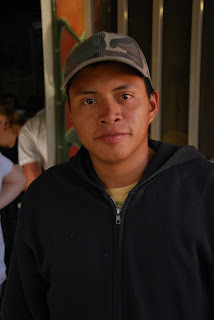Mary was riding
on a burro alongside the border wall during the Migrant Posada in Nogales on
December 14. The posada is a procession
that reenacts the journey of Mary and Joseph seeking shelter for the birth of
Jesus. We stopped at three stations
along the border where we listened to the migrants describe the rejection and
abuse they had suffered during their journey.
Mary and Joseph, and the migrants, were finally welcomed inside at the
Kino Border Initiative “comedor” (meal program) at the end of the procession.
Julio was still
in shock when I met him at the comedor that morning. He told me that he had been walking through
the Food City parking lot in south Tucson at 6 A.M. to meet a friend for a
roofing job. A policeman stopped him and
said, “Show me your I.D.” Julio replied
that he didn’t have it and he was then frisked and ordered into the patrol
car. The policeman called the Border
Patrol and Julio was “repatriated” to Nogales a couple hours later.
Julio lived in
the U.S. for 15 years and is married to a U.S. citizen. He said, “I used to drink and use drugs, but
then I found God, and my life changed…I don’t understand why this happened to
me today.” He doesn’t know anyone in
Nogales and he had no idea what he was going to do, not even in the next
moment.
I met Sergio the
following morning as I was hiking along one of the migrant trails north of the border. He told me that he lived for five years in
the U.S. and has a spouse and a three-year-old son in New York. He had been deported and was trying to return
to his home and family.
Sergio had been
walking for two days and he said it was very cold at night – the temperature
had dropped to 28 degrees the previous day.
I gave him some warm clothes, a blanket, food and water; and told him “I
hope you’re able to be with your son for Christmas.”
 |
| "We want family unity for the children of immigrants" |


















